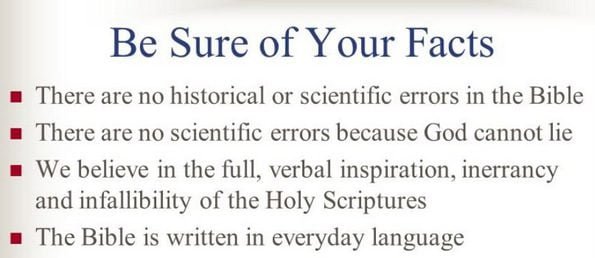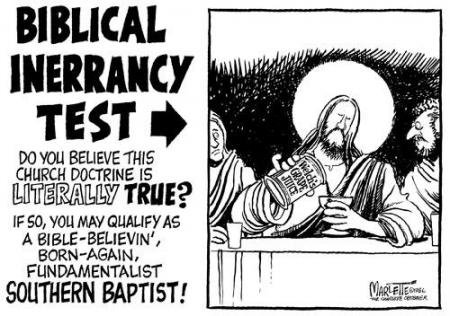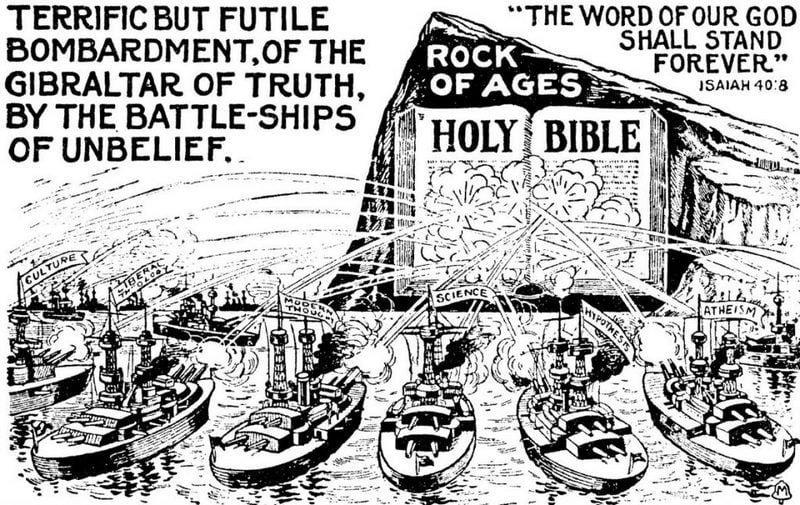
Evangelicals believe that the Protestant Christian Bible is their God’s inspired, inerrant, and infallible words. “Inspired” is a faith claim for which there is no evidence. Either you believe the Bible is inspired by God or you don’t. “Inerrant” and “infallible” are claims, however, that can be investigated by Christians and non-Christians alike. Is the Bible actually without error? Is the Bible really infallible (incapable of error)?
As a student at Midwestern Baptist College in Pontiac, Michigan in the 1970s, I was taught the transcription theory. Holy men of old, as they were moved by the Holy Spirit, wrote down, word for word in Hebrew, Greek, and Aramaic, the words of God. Some professors believed that the inspired writers of the Bible fell into a trance as they put pen to paper, writing down the exact words of God. Other professors and chapel speakers were uncertain as to the actual transmission process. They just knew that the end product was the very words of God.
I was also taught at Midwestern that inspiration, inerrancy, and infallibility applied to translations too. Well, actually one translation: the King James Version (either the 1611 edition or the 1769 revision). While there was some behind-the-scenes debate over whether the KJV was “inspired,” there was no debate over whether the KJV was inerrant and infallible.
Peruse the websites of churches pastored by Midwestern grads and you will typically find a sentence that says “_______ Baptist Church only uses the King James Version.” Some churches proudly advertise in their printed materials and on their signs their fealty to the KJV.
Some Midwestern pastors take a different approach. Take First Baptist Church in Milford, Ohio (pastored for many years by my best man, Bill Duttry). Their doctrinal statement states:
We believe in the authority of Scripture. We believe that the Bible is the plenarily and verbally inspired, inerrant, living Word of God. We believe that God has divinely and faithfully preserved His Word for all people today in the Hebrew Masoretic text and the Greek Textus Receptus. We use only the Authorized King James Bible for faith and practice in English.
According to this statement, what is inspired, inerrant, and infallible is the Masoretic text (Old Testament) and the Greek Textus Receptus (New Testament), not the King James Bible. Does that mean that First Baptist of Milford believes the KJV is errant and fallible? No. Note carefully the words “God has divinely and faithfully preserved his Word.” Many Evangelicals believe that God has somehow, some way, over the past 2,000 years preserved his Words in the thousands of Hebrew and Greek manuscripts and subsequent translations. Not all translations, of course, just those that were translated from certain manuscripts. Typically, such churches and pastors accept translations based on what is called the Received Text — a family of Greek manuscripts that were used to translate the King James Bible. They reject the Alexandrian (Wescott and Hort) line of manuscripts, believing translations that were translated from these manuscripts are inferior or even Satanic.

First Baptist Church in Bryan, Ohio, pastored by John MacFarlane, believes:
We believe in the Scriptures of the Old and New Testament as verbally inspired of God, inerrant in the original writing and of supreme and final authority in faith and life. II Timothy 3:16-17.
We accept only the King James version for public instruction in the church.
First Baptist has an article on its site written by Pastor Michael Bates titled Why Do We Use the KJV?
The English translation issue has caused no small stir among conservatives and evangelicals today. It is not our desire to be contentious about this issue, but we do desire to preach and teach with clarity.
It is our conviction that the whole translation debate hinges on three basic questions that must be answered in the following order:
1. Has God preserved His inspired Word? In fact, has He even promised to do so? If God has not promised to preserve His words—and all of them, then all discussions regarding which Hebrew & Aramaic or Greek Text is superior and which translation is best is all academic, at best.
To this question we answer in the strongest affirmative possible.
….
2. If it is preserved, where is it preserved? Is it preserved in any specific Text or in all the texts or in only the so-called “oldest and best manuscripts?” One should expect to locate God’s words if they are preserved.
We believe that those texts often referred to as the Traditional Text, known more commonly as the Ben Chayyim Masoretic text of the Old Testament and the Textus Receptus of the New Testament, hold those preserved words.
….
3. Do the Lord’s churches in the English-speaking world have a faithful, accurate translation of that preserved Word that they can call reliable?
The last English translation of the Hebrew and Greek texts listed above was done in the seventeenth century by the translators of what has come to be called the King James Version of the Bible (known also as the Authorized Version), first published in 1611. Most, if not all, of the modern versions have been translated out of a different Greek text in the New Testament called the Eclectic Text or the Critical Text. We reject these texts as only containing the Word of God. Furthermore, the Hebrew text underlying these modern versions is different from that used by the KJV.
Therefore, a local church must make a decision guided by the Scripture as to which translation is in fact God’s words in their language based upon its underlying text. We recognize that God did not breathe out English words, but the inspired words He did breathe out have been accurately and correctly translated into our language in the King James Version.
Once you move beyond King James-only churches, you find Evangelical congregations and pastors who believe certain English translations are faithful and reliable, not inerrant and infallible. These churches and pastors believe that it was the original manuscripts that were inspired, inerrant, and infallible. Of course, the glaring problem with this position is the fact that these manuscripts do not exist. All we have are copies of copies of copies, some of which dates centuries after their recorded events.
A Biblical Archeology Society article titled Dating the Oldest New Testament Christian Manuscripts states:
The New Testament that we read today in many different translations is not based on one single manuscript of the original Greek text. Why? There simply is no such thing as a complete text of the New Testament that we could date to the apostolic times, or even two or three centuries after the last of the apostles. Extant manuscripts containing the entire Christian Bible are the work of medieval monks. The modern scholarly editions of the original Greek text draw on readings from many different ancient manuscripts. As a result, the New Testament presented in any of our Bibles does not correspond to a single, authoritative ancient manuscript.
The oldest surviving examples of the New Testament come to us, instead, as fragments and scraps of papyrus excavated (mostly) in Egypt. How old are the oldest of these biblical fragments, and why does it matter whether they were written in the first or the fourth century?
At best, the extant manuscripts are errant, fallible approximations of the original manuscripts. If the manuscripts are errant and fallible, then the translations made from them are too.
Evangelicals preachers and professors who say the Bible is inerrant and infallible are either uneducated or deliberately misleading people. In my case, I was uneducated. I was thirty years old before I learned that the King James Bible was not inerrant. It would take many more years of study before I concluded that the Bible — both at the translation and manuscript level — contained errors, mistakes, and contradictions. While I still believed the Bible was the Word of God, I came to see and understand its human nature and fallibility.
Most educated Evangelical preachers know the Bible is not inerrant or infallible. Anyone who carefully studies the Bible, both in its original languages and in English — knows that there are textual problems that cannot be explained away. They also know that there are internal conflicts and contradictions that cannot be harmonized. Why, then, do Evangelical preachers not share these things with their flocks? Why do they hide the fallible human nature of the Bible?

Most Evangelical laypeople believe that the Bible they carry to church on Sundays and read during the week is without error. No one has ever told them the truth about the nature and history of the Biblical text. Evangelical preachers pride themselves on being truth-tellers. Why don’t they tell church members the truth about the Bible? One word: fear. They fear that if they did people would lose faith in God, the church, and the Bible. Imagine being called on to account for hiding the truth from their churches. People would leave, offerings would drop, and many preachers would end up looking for new employment. Not wanting turmoil and controversy, pastors, instead, try to maintain the status quo. This, of course, is getting harder to do thanks to the Internet. Evangelicals can easily find articles and books that challenge their beliefs about the Bible. Dr. Bart Ehrman’s books, in particular, have forced countless Evangelicals to rethink what they believe about the history and nature of the Bible. If you have not read any of Ehrman’s books, I encourage you to do so:
The Triumph of Christianity: How a Forbidden Religion Swept the World
Misquoting Jesus: The Story Behind Who Changed the Bible and Why
How Jesus Became God: the Exaltation of a Jewish Preacher from Galilee
Did Jesus Exist?: The Historical Argument for Jesus of Nazareth
Forged: Writing in the Name of God–Why the Bible’s Authors Are Not Who We Think They Are
God’s Problem: How the Bible Fails to Answer Our Most Important Question — Why We Suffer
I am confident that if Evangelicals will openly and honestly read Ehrman’s books, they will be disabused of the notion that the Bible is inerrant and infallible. Of course, there will always be Evangelicals who are so closed-minded that there is no hope of reaching them. Dr. David Tee, whose real name is Derrick Thomas Thiessen, is a case in point. Thiessen recently wrote a blog post titled The Bible is Inerrant and Infallible:
If one wants to question the Bible, then they are questioning its author. There is no way to separate the two. Many unbelievers will say that science has disproven the Bible many times over. That has never been done.
What the people ignore or miss when making that statement is that there is no one or no thing in history that has appointed science to be an authority over the Bible and its content. Neither God nor Jesus has made that appointment or taught anywhere that the Bible is submissive to science, or any research field.
There are no other supernatural beings that can make that appointment either. Science is subject to the Bible and not its lord. No matter what scientific method you use, especially bible criticism, historical-critical thinking, and so on, these methods do not get to the truth nor are they superior to God and his word.
God does not make mistakes, he does not lie, he does not perform magic, he does not play games, and he does not mislead. What he has written in the Bible is without error and it is accurate and true.
In the book, Dr. Lindsell mentions that some of those who hold to the errancy and fallibility of the bible will also clarify their comments by adding that the Bible is inerrant and infallible when it comes to salvation but it is not when it comes to history and science.
But those people are trying to have their cake and eat it too. of course, they will say the parts about salvation are infallible, etc., because they want to go to heaven and not end up in hell. The Bible is either infallible and inerrant in all of its content or it is not.
There is no middle ground and all Christians have to make a choice here. That argument claiming only salvation is inerrant, etc., is like saying your wife is a little bit pregnant. Either she is or she isn’t. There is no middle ground.
You either believe God or you don’t.
Thiessen is a hardcore Fundamentalist — proudly so. He is certain that his beliefs are 100 percent right. His beliefs are every bit as inspired (by the Holy Spirit), inerrant, and infallible as the Bible itself. I have been reading Thiessen’s writing for several years now. I have yet to see him admit that he was wrong; that he made a mistake. Instead, he spends his time pointing out how wrong other people are — atheists and Christians alike.
There are lots of Thiessen-like preachers in the world; men who are either uneducated or who believe that it is more important to protect sectarian dogma than it is to tell people the truth. Thiessen began his post by mentioning Harold Lindsell’s 1976 book, The Battle for the Bible. Lindsell was an Evangelical author and scholar, one of the founders of Fuller Theological Seminary. Lindsell’s seminal book played an instrumental part in the battle for the soul of the Southern Baptist Convention. I read and re-read The Battle for the Bible several times in the late 1970s and 1980s, not because I doubted the Bible, but because I wanted to know how “liberals” viewed the Bible. At the time, I believed liberals were apostates or false Christians; tools of Satan who were destroying the faith of Evangelicals. I viewed these scholars as enemies of God. What I didn’t do is read their books. I had lots of books in my library that promoted and reinforced the Evangelical view on the inspiration, inerrancy, and infallibility of the Bible. It would take decades of study — including reading the books of authors I had previously deemed false prophets — before I finally saw the light. The only way to reach Derrick Thiessen and countless other inerrantists is to get them to read books that challenge their sincerely held beliefs. I remember asking Thiessen if he had ever read any of Bart Ehrman’s books. Thiessen tried to intimate that he had “read” Ehrman, but when pressed on the issue, I found out he had read articles and blog posts about Ehrman’s books, not the actual books themselves. Thiessen is hardly alone in this matter. Evangelical preachers are notorious for their opposition to all sorts of things without ever actually doing their homework. They just regurgitate what one of their preacher friends or favorite authors have said in their books or on their blogs.
Nothing in this life is without error, and that includes the Bible. One can still believe in God and be a Christian without an inerrant Bible. Sixteen centuries of followers of Jesus didn’t have an inerrant, infallible Bible. Were they True Christians? Of course, they were. I double-dog dare you to argue that salvation requires the right beliefs about the Bible. Oh, please, make my day by claiming that someone can’t be born again unless they hold to a certain viewpoint about the Bible. 🙂
Bruce Gerencser, 66, lives in rural Northwest Ohio with his wife of 45 years. He and his wife have six grown children and thirteen grandchildren. Bruce pastored Evangelical churches for twenty-five years in Ohio, Texas, and Michigan. Bruce left the ministry in 2005, and in 2008 he left Christianity. Bruce is now a humanist and an atheist.
Connect with me on social media:
Your comments are welcome and appreciated. All first-time comments are moderated. Please read the commenting rules before commenting.
You can email Bruce via the Contact Form.
